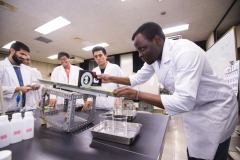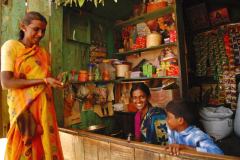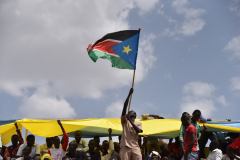JICA Ogata Research Institute Share Findings at the 32nd JASID Annual Conference
2022.01.26
The 32nd Japan Society for International Development (JASID) Annual Conference was held online (hosted by Kanazawa University) over two days, from Nov. 20 to 21, 2021. Sessions covering various topics such as education, medicine, health, agriculture, post-disaster restoration, COVID-19, civil society and peace were held. Researchers from the JICA Ogata Sadako Research Institute for Peace and Development (JICA Ogata Research Institute) presented their findings. A summary of the presentations given by each research cluster is provided below.
In the Education Session (English), Part-Time Research Assistant Lauren Nakasato and Senior Research Advisor Kayashima Nobuko presented a paper: “Student Mobility to Japan in the Age of COVID-19: A Matter of Degree”. The paper contextualized Japan's inbound student mobility during COVID-19 within worldwide trends, finding that while some major study abroad destination countries experienced large drops in international student enrollment, degree-seeking international students to Japan had in fact increased. The paper argued that Japan’s existing emphasis on attracting degree-seeking students and the availability of online courses may have mitigated the negative impact of COVID-19 on student mobility to Japan. Commentators and fellow presenters discussed the potential effect of student demographics on the interview results, changes in the rate of increase of degree students over time and JICA’s key role in the promotion of study abroad to Japan.

Degree-seeking international students to Japan had increased during COVID-19 crisis (Photo: JICA/Kuno Shinichi)
In the Education II Session (Japanese), Kayashima and Sugimura Miki, JICA Ogata Research Institute Visiting Fellow and professor at Sophia University, gave a presentation on “Japan’s ODA Scholarship Programs for International Students: Kokuhi Scholarship and JICA Scholarship,” based on the outcomes of the JICA Ogata Research Institute research project “Japan’s Development Cooperation: A Historical Perspective.” The history of international student mobility to Japan through the ODA scheme was discussed while examining changes in Japan’s political intents and the worldwide economic and geopolitical environment surrounding international student mobility. Furthermore, the roles and characteristics of Kokuhi Scholarships (Japanese Government Scholarships) and JICA Scholarship were articulated through a statistical analysis. The commentators touched on topics including the degree of political intent attainment, the attractiveness of studying in Japan from the perspective of developing countries, and the relationship between the acceptance of international students and the globalization of universities. Active discussion followed.
In the Environment and Restoration session, Adachi Ichiro, executive senior research fellow, was the chair, while Ishiwatari Mikio, a JICA senior advisor, served as a commentator. Case study reports on international cooperation in environmental and restoration (disaster prevention) fields were made, and the importance of utilizing the capacity of recipient countries was discussed by analyzing cases of peatland management and disaster restoration support in Asian countries. Ishiwatari pointed out the importance and difficulty of making study reports based on case analyses of practices and suggested the need for further advanced research. The session was closed by Adachi, saying that the importance of cooperation with a bottom-up approach, catered to the situation of the recipient country, has been confirmed.
In the session Peace, Democracy and Global Divide, chaired by Hanatani Atsushi, senior research fellow, four presentations were made based on the research on the following themes: global citizenship education in Vietnam; self-governance by local residents in Mexico; technocracy in peacekeeping in the Philippines; and the Self Employed Women's Association of India. The commentators pointed out areas where research questions, analytical frameworks and justification of research subject selection can better be framed and an exchange of views ensued on such comments. The chair concluded the session by confirming the significance of the session where unique efforts by local organizations which are effective in addressing globally common challenges were widely shared.

Women entrepreneurs in small and medium enterprises in India (Photo: JICA)
In the session Civil Society, Professor Furukawa Mitsuaki of the University of Shizuoka gave a presentation under the theme “The Effects of National Sporting Events on Spectators in Conflict-affected Countries: The Case of South Sudan,” based on JICA Ogata Research Institute’s project “Study on Peace and Development Through Sports.” National Unity Day is an annual national sports event held for peace and unity in South Sudan since 2016. The study subject was the fifth National Unity Day (held in Juba, the capital city, in January 2020) and the results of the assessment on whether awareness and behavior of Juba residents changed through National Unity Day were reported. After the presentation, the commentator asked questions that included the breakdown of the studied Juba residents by their places of origin and how sensitive questions were handled.

National Unity Day is an annual national sports event held for peace and unity in South Sudan
Shiga Hiroaki, executive senior research fellow spoke at the roundtable titled “Exploring the Interface Between Research and Practice: Research x Practice Committee Roundtable,” hosted by the Research x Practice Committee which was established by JASID to facilitate collaboration between researchers and practitioners in the development field. To raise a question, he asked, “When we say ‘collaboration between research and practice,’ we normally mean providing the right answers to highly specific needs at the frontline based on scientific methods by researchers. While it is necessary for researchers to address agendas set by practitioners, isn’t something the other way round also important? That is, isn’t it important more than ever for researchers to raise fundamental questions from highly abstract perspectives against the agendas set by practitioners and the existing concepts they rely on?”

事業事前評価表(地球規模課題対応国際科学技術協力(SATREPS)).国際協力機構 地球環境部 . 防災第一チーム. 1.案件名.国 名: フィリピン共和国.

事業事前評価表(地球規模課題対応国際科学技術協力(SATREPS)).国際協力機構 地球環境部 . 防災第一チーム. 1.案件名.国 名: フィリピン共和国.

事業事前評価表(地球規模課題対応国際科学技術協力(SATREPS)).国際協力機構 地球環境部 . 防災第一チーム. 1.案件名.国 名: フィリピン共和国.

事業事前評価表(地球規模課題対応国際科学技術協力(SATREPS)).国際協力機構 地球環境部 . 防災第一チーム. 1.案件名.国 名: フィリピン共和国.

事業事前評価表(地球規模課題対応国際科学技術協力(SATREPS)).国際協力機構 地球環境部 . 防災第一チーム. 1.案件名.国 名: フィリピン共和国.
scroll